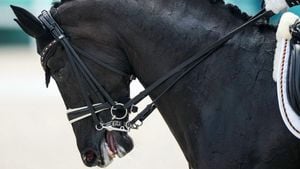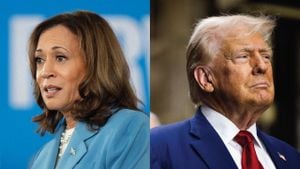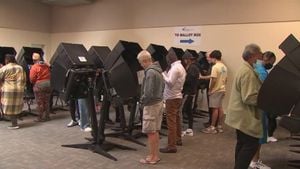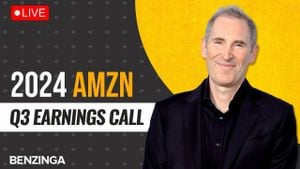A recent comedy performance by Tony Hinchcliffe has stirred considerable controversy, particularly following disparaging comments he made about Puerto Rico during a rally for former President Donald Trump at Madison Square Garden. The comedian, known for his sharp and edgy humor, described Puerto Rico as "a floating island of garbage," igniting backlash from audiences and public figures alike.
Hinchcliffe, who has built his career on insult comedy—where brutal roasts and personal jabs are the norm—found himself at the center of attention not just for his humor but for the strong negative reactions it provoked. His comments have raised questions about the line between comedy and insensitivity, particularly when it involves cultural and national identities, shedding light on how such remarks can inflame tensions within diverse communities.
Among those who have responded vocally is singer and actress Jennifer Lopez, who condemned Hinchcliffe's remarks during her appearance at a rally supporting Democratic presidential nominee Kamala Harris. Lopez passionately defended Puerto Ricans, saying, "It wasn’t just Puerto Ricans who were offended; it was every Latino, it was humanity, and anyone of decent character." She stressed the need for respect and unity, particularly when controversial figures such as Hinchcliffe use platforms to spread messages of division.
During her speech, Lopez reflected on the societal impact of derogatory comments, asserting, "I’m a lover, not a fighter," and expressed her deep feelings for her Puerto Rican heritage, saying, "I am Puerto Rican, and we are Americans." Her remarks serve as powerful reminders of the importance of cultural pride and representation, especially within the entertainment industry.
The fallout from Hinchcliffe's comments coincides with broader conversations about representation and inclusivity. Critics argue his jokes not only perpetuate stereotypes but also trivialize real struggles faced by Puerto Rico, particularly following devastating hurricanes like Maria and Irma, which have left lasting impacts on the island and its people. Such comedic approaches have led figures like Harris to stress the necessity of electing leaders who genuinely advocate for all citizens, rather than dividing them.
Matt Sienkiewicz, chair of the communication department at Boston College and an expert on right-wing comedy, suggested Hinchcliffe's actions might paradoxically benefit his career by providing him substantial media exposure. "The economy for a comedian is attention," Sienkiewicz noted, implying Hinchcliffe's provocative humor might introduce him to wider audiences, whether positively or negatively.
While true, the broader question remains whether this attention is positive or detrimental. Many argue attention gained through controversy can taint a comedian's reputation, especially if audiences may begin to associate them with maligning remarks about marginalized groups. Critiques of Hinchcliffe's performance have pointed out how shocking humor can quickly alienate audiences who seek meaningful engagement rather than casual contempt.
Hinchcliffe insists his comedic style is not politically motivated; he primarily engages with audiences through shock value and wit rather than overt political commentary or advocacy. Nonetheless, the setting of his routine—a Trump rally—has inevitably tied his humor to the political climate, raising alarms about the responsibility of entertainers within these charged environments.
On the other hand, comedians often navigate fine lines when it involves cultural and political observations. Some argue this incident reflects a changing society increasingly intolerant of humor considered to be crossing the line. It brings to the forefront discussions on the balance comedians must strike between freedom of expression and societal responsibility, especially when targeting culturally sensitive subjects.
Hinchcliffe's career has been characterized by different highs and lows, having received both prestige and backlash for previous performances. His involvement at high-profile events such as sports celebrity roasts adds to his reputation as someone not afraid to tackle sensitive topics. Yet, comedy's inherent subjectivity means what feels funny to one audience member may be offensive to another.
This episode, along with Lopez's impassioned response, exemplifies how cultural identity and representation are not merely buzzwords but impactful conversations within today’s entertainment milieu. It signifies how public figures must carry the torch of advocacy when their communities face disparagement, and how every performance stage is also a platform for socio-political discourse.
Lopez concluded her rally speech by emphasizing empowerment and representation, stating, "Elections are about choosing leaders who support...not one who stands in the way." The backing from influential figures like Lopez during these debates symbolizes the growing recognition among celebrities of their roles as advocates for equity and inclusion.
While the future remains uncertain for Hinchcliffe, what is clear is the need for careful dialogue and constructive criticism. The ability of individuals to learn from these discussions could pave the way for comedians to shape their crafts responsibly—reshaping comedy to be inclusive rather than divisive.
Such conflicts remind society of the power of words—how humor can unite or divide. The choice of how to wield it can either encourage community or perpetuate harmful stereotypes. This recent encounter is paving the way for comedians and public figures alike to rethink the messages they disseminate, shaping the future of comedy as it encompasses all identities.



